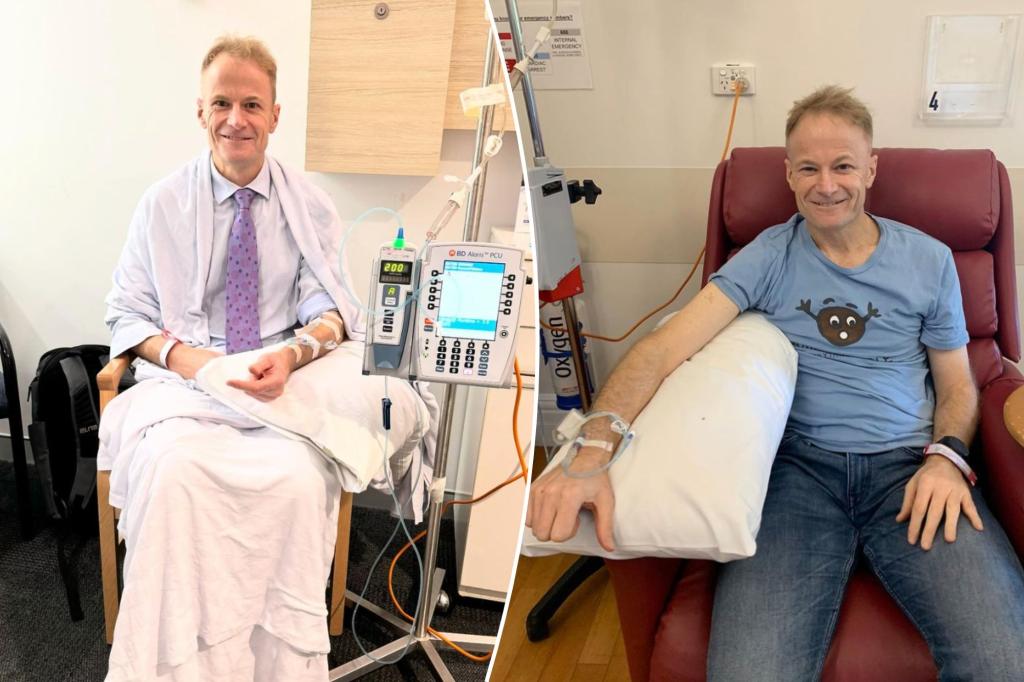Health
Professor Richard Scolyer had earned a reputation as a world leading pathologist when he was diagnosed with an incurable brain tumor in June.
The 56-year-old, who has been recognized for his pioneering melanoma research, knew the cancer diagnosis meant “certain death.”
Now he’s acting as “guinea pig” and undergoing world-first treatment in an attempt to save his own life.
“I want to do something that gives me a fighting chance against this tumor to see if we can make a difference,” he told ABC’s “Australian Story,” which will share his journey during Monday night’s program.
Scolyer was traveling Europe and lecturing at medical conferences when he woke up with a headache and suffered a seizure in May.
The day before, the ultra-fit Sydney father-of-three was hiking the mountains of southern Poland with his pathologist wife Katie.

“I felt normal. I didn’t have any symptoms at all,” he told “A Current Affair” earlier this year.
After flying back to Australia and undergoing tests, he was diagnosed with glioblastoma in June – an aggressive and terminal form of brain cancer that would give him a median of 14 months to live.
The treatment, which had not changed in 18 years, typically involves surgery followed by radiation and chemotherapy.
The news turned his life “upside down.”
“Not only is it tough on me but has had a massive impact and made life very difficult for those closest to me,” he shared on social media.
One of many to feel the grief was his friend and medical oncologist Georgina Long, who was jointly named the 2024 NSW Australian of the Year, alongside Scolyer for their lifesaving melanoma work.
After consulting experts, Professor Long decided on combination immunotherapy, which would be delivered before and after Scolyer’s surgery to remove the tumor.
He’d also receive six weeks of radiotherapy after surgery and be administered a vaccine personalized to combat the tumor.
“We’ve taken everything, absolutely every bit of knowledge … that we’ve pioneered in melanoma and we’ve thrown it at Richard’s tumor,” Professor Long told “Australian Story.”

But the world-first treatment came with a risk.
“No one knew what it was going to do, people were nervous because it could actually cause my life to end more quickly. But when you’re faced with certain death, it’s a no-brainer for me,” said Scolyer, who also hoped the treatment would make a difference for other cancer patients.
Since undergoing the treatment, Scolyer has documented his journey on social media for the world to see.
In June, he shared his nerves from his hospital bed before he underwent a surgery to remove as much of his tumor as possible.
“I’m in the pre-surgical suite at Royal Prince Alfred hospital where I worked for 25 years,” he said in a video. “I’m anxious and nervous about how it’s going to turn out but I know I’m in great hands.”
Early results from the treatment were positive, showing the number of immune cells had increased 10 fold.
A week ago, the 56-year-old shared an update on social media, revealing a recent MRI scan was “stable or possibly even better than two months ago.”
“Could Prof Georgina Long’s treatment strategy of neoadjuvant combination immunotherapy +/-personalized anticancer vaccine be having a positive effect? Too early to know but great hope for the future!” he wrote.
Remaining active, Scolyer also shared he completed a 5K run with his son and rode 56 miles to help raise funds for cancer research over the weekend.
“I enjoy exercising and find it’s good for my mental health and happiness. As anaemia improves, so does my exercise form … I hope to ride in the 2024 Signature Tour in #Tassie!” he wrote in a post.
While the results are so far encouraging, Scolyer and the team said they are waiting to see if they remain consistent for another few months before they “really celebrate.”
“There’s a lot of hope for Richard and I want him around long term,” said Long.
Load more…
{{/isDisplay}}{{#isAniviewVideo}}
{{/isAniviewVideo}}{{#isSRVideo}}
{{/isSRVideo}}
